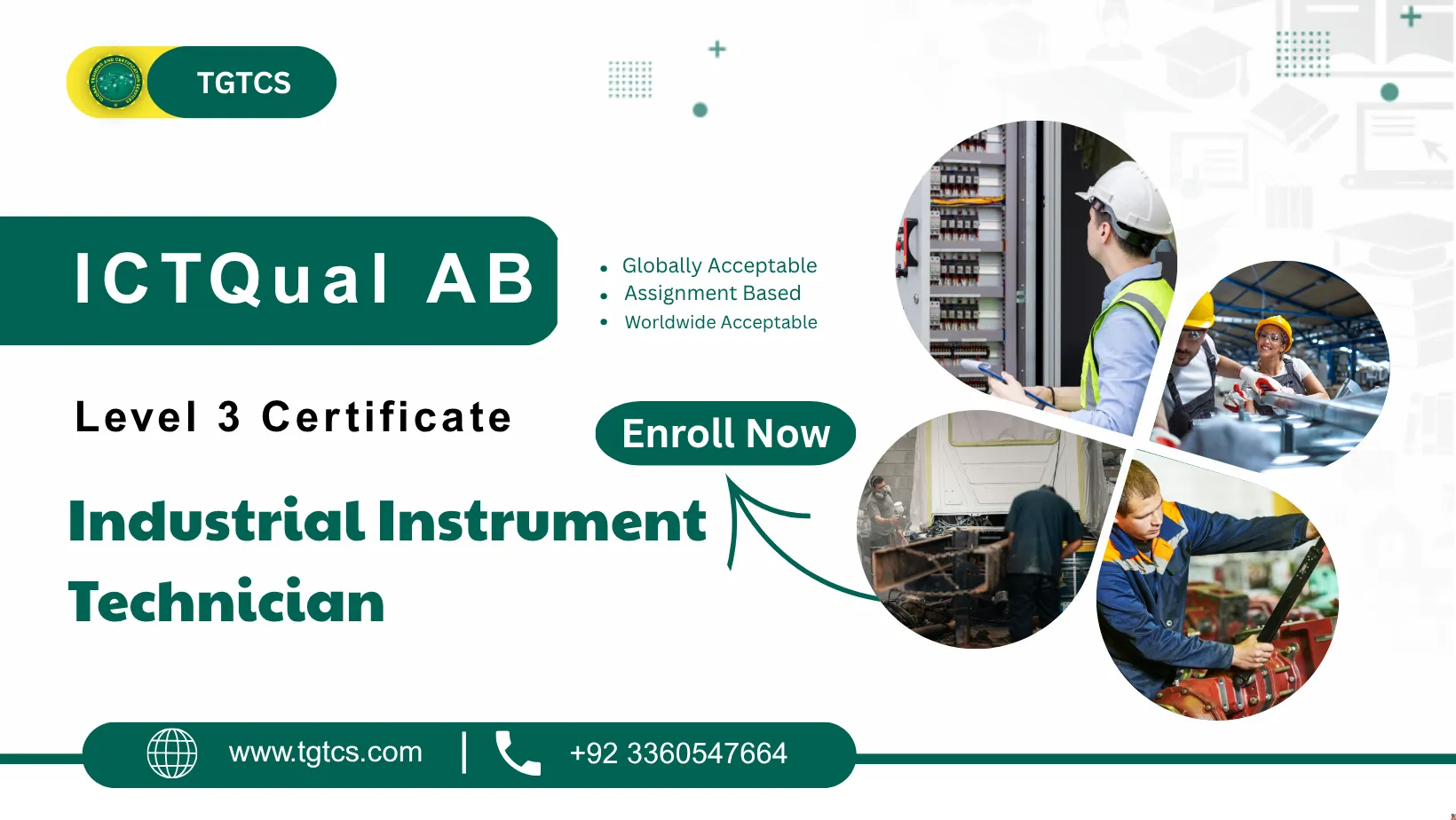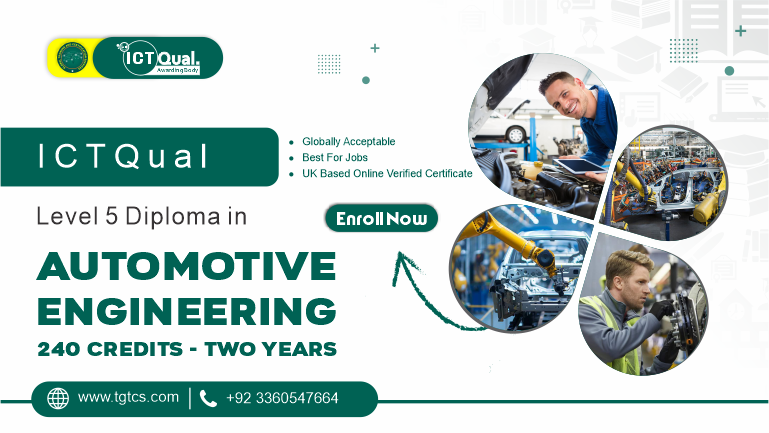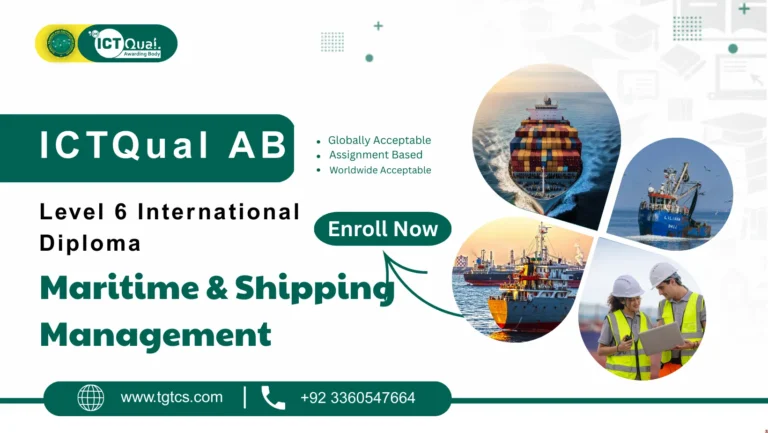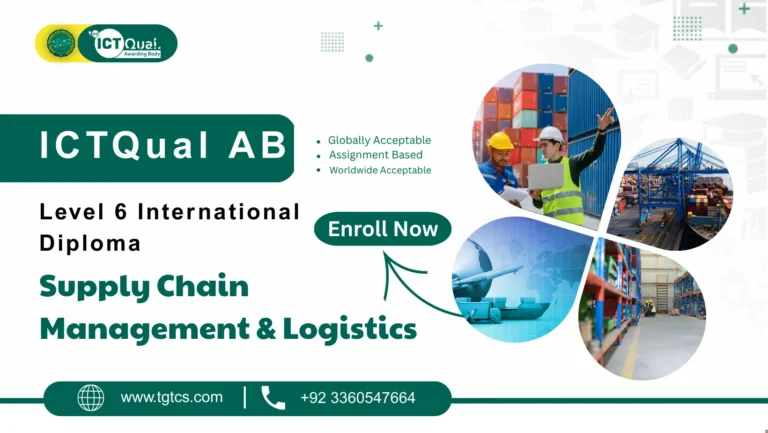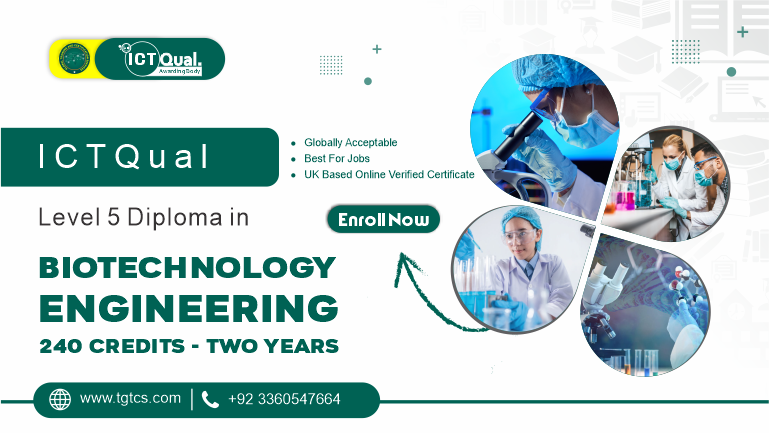ICTQual AB Level 3 Certificate in Industrial Instrument Technician
The ICTQual AB Level 3 Certificate in Industrial Instrument Technician is a specialized vocational qualification designed to prepare learners for technical roles in industrial instrumentation and control systems. This course provides a solid foundation in the principles of measurement, calibration, and maintenance of industrial instruments used across sectors such as manufacturing, oil and gas, power generation, and chemical processing. It is ideal for individuals seeking to enter the field or enhance their existing skills with a recognized certification that aligns with industry standards.
Throughout the program, learners will gain hands-on experience with various types of sensors, transmitters, controllers, and data acquisition systems. The curriculum emphasizes practical skills in installation, troubleshooting, and diagnostics, alongside theoretical knowledge of process control, automation, and safety protocols. Learners will also develop the ability to interpret technical drawings and documentation, ensuring they are well-equipped to operate in complex industrial environments.
By completing this qualification, graduates will be prepared to take on technician-level responsibilities with confidence and competence. The ICTQual AB Level 3 Certificate not only enhances employability but also serves as a stepping stone for further professional development in instrumentation and control engineering. With a focus on real-world applications and industry relevance, this course opens doors to rewarding careers in a wide range of technical and engineering fields.
Course Level and Credits
The ICT
Mode of Study
The cou
Global Recognition & Attestation
This diplom
Scope and Purpose
The course is de
Skills and Knowledge Gained
Learners devel
Career Benefits
Graduates
Mandatory Unit
This qualification, the Level 3 Certificate in Industrial Instrument Technician, consists of 6 mandatory units.
- Fundamentals of Industrial Instrumentation
- Process Variables: Pressure, Temperature, Flow, and Level
- Instrument Calibration and Testing Techniques
- Industrial Sensors, Transducers, and Control Valves
- Programmable Logic Controllers (PLCs) and Process Automation
- Maintenance, Troubleshooting, and Industrial Safety
Learning Outcomes for the Level 3 Certificate in Industrial Instrument Technician:
Fundamentals of Industrial Instrumentation
- Understand the basic principles and scope of industrial instrumentation within modern industries.
- Explain the role of instrumentation in monitoring, controlling, and optimising industrial processes.
- Identify different types of instruments and their applications in various sectors.
- Demonstrate knowledge of measurement systems, accuracy, precision, and error analysis.
- Recognise the importance of standardisation, codes, and international practices in instrumentation.
- Apply fundamental electrical and electronic concepts relevant to instrumentation systems.
- Develop an appreciation of the link between instrumentation, automation, and industrial efficiency.
- Build a foundation for advanced study in process control and instrumentation technologies.
Process Variables: Pressure, Temperature, Flow, and Level
- Define and explain the four key process variables and their significance in industrial operations.
- Describe the principles and methods used to measure pressure, temperature, flow, and level.
- Compare different types of sensors and devices used for each process variable.
- Analyse the impact of process variables on system performance, safety, and quality.
- Apply knowledge of process variables to select appropriate measurement instruments.
- Interpret data from process variable measurements to support decision-making.
- Understand calibration requirements for process variable instruments.
- Relate process variable control to overall process optimisation and energy efficiency.
Instrument Calibration and Testing Techniques
- Explain the purpose and importance of calibration in maintaining instrument accuracy.
- Identify international standards and procedures for calibration and testing.
- Perform step-by-step calibration of common industrial instruments.
- Use calibration tools and equipment safely and effectively.
- Record, interpret, and evaluate calibration results for compliance and quality assurance.
- Troubleshoot errors and deviations identified during calibration.
- Understand the role of preventive maintenance in reducing calibration failures.
- Develop professional competence in documenting calibration and test reports.
Industrial Sensors, Transducers, and Control Valves
- Differentiate between sensors, transducers, and actuators in industrial applications.
- Explain the working principles of common industrial sensors and transducers.
- Select appropriate sensors for specific process requirements.
- Understand the design, function, and operation of control valves.
- Analyse the role of control valves in regulating process variables.
- Apply knowledge of valve characteristics, sizing, and selection criteria.
- Recognise common faults in sensors and valves and propose corrective actions.
- Integrate sensors and control valves into automated control systems.
Programmable Logic Controllers (PLCs) and Process Automation
- Understand the architecture and components of PLC systems.
- Explain the role of PLCs in industrial automation and process control.
- Develop basic PLC programming skills using ladder logic or equivalent languages.
- Configure input and output devices for PLC-based systems.
- Apply PLCs to monitor and control industrial processes.
- Integrate PLCs with sensors, actuators, and communication networks.
- Troubleshoot common PLC hardware and software issues.
- Appreciate the role of PLCs in Industry 4.0 and smart manufacturing.
Maintenance, Troubleshooting, and Industrial Safety
- Understand the principles of preventive, predictive, and corrective maintenance.
- Apply systematic troubleshooting techniques to diagnose instrument faults.
- Use diagnostic tools and test equipment effectively in maintenance tasks.
- Recognise the importance of safety standards and regulations in instrumentation work.
- Implement safe working practices when handling instruments and control systems.
- Identify potential hazards in industrial environments and propose mitigation strategies.
- Document maintenance and troubleshooting activities in line with industry standards.
The ICTQual AB Level 3 Certificate in Industrial Instrument Technician provides learners with the essential technical skills and practical knowledge required to begin or advance a professional career in industrial instrumentation and process control. Completing this course equips learners to work confidently with instrumentation systems, support maintenance and calibration activities, and contribute effectively to industrial operations across various sectors.
Core Instrumentation Skills
- Install, calibrate, and maintain industrial instruments including sensors, transmitters, and controllers
- Interpret and work with P&ID diagrams, loop drawings, and technical schematics
- Perform routine diagnostics and troubleshoot faults in instrumentation systems
- Use standard tools and equipment for accurate measurement and calibration
- Understand the principles of process control and automation in industrial environments
System Integration and Safety
- Understand the role of instrumentation within SCADA, PLC, and DCS systems
- Apply safety protocols and adhere to regulatory standards during instrumentation tasks
- Support documentation and reporting for calibration and maintenance procedures
- Identify faults in instrumentation systems and assist in implementing corrective actions
- Ensure compliance with industrial specifications and operational guidelines
Professional Development and Career Growth
- Prepare for technician-level roles in instrumentation and control across various industries
- Gain a recognized qualification that enhances employability in global industrial markets
- Build a strong foundation for progression to advanced diplomas or engineering programs
- Develop teamwork, communication, and problem-solving skills in technical environments
- Acquire practical experience to contribute effectively to instrumentation and control projects
Completing this certificate provides learners with a strong foundation in industrial instrumentation, system integration, and safety practices, enabling them to take confident steps toward a successful career in process control and automation.
The ICTQual AB Level 3 Certificate in Industrial Instrument Technician is designed for individuals who are motivated to build a career in industrial instrumentation and control systems. Whether starting out or seeking to enhance existing skills, this course offers a structured pathway for learners with a technical mindset and a desire to work in dynamic industrial environments.
Aspiring Instrumentation Technicians
- Individuals who have completed secondary education and are interested in technical careers
- Learners seeking hands-on training in instrumentation and process control
- Those who want to understand how industrial systems operate and are maintained
- Candidates aiming to work in sectors like oil & gas, manufacturing, or energy
- People who prefer practical, skill-based learning over purely theoretical study
Technical School and Vocational Graduates
- Holders of diplomas or certificates in electrical, mechanical, or automation fields
- Learners seeking to expand their qualifications with instrumentation-specific training
- Individuals aiming to transition from general technical roles to specialized instrumentation work
- Those looking to meet employer requirements for certified instrumentation personnel
- Candidates preparing for further studies in engineering or industrial technology
Maintenance and Operations Personnel
- Maintenance technicians seeking to add instrumentation to their skill set
- Operators who want to understand the systems they interact with more deeply
- Employees aiming for promotion into instrumentation or control roles
- Staff involved in troubleshooting and diagnostics of industrial systems
- Workers who need formal certification to meet compliance or job advancement criteria
Career Changers and Industry Entrants
- Career changers with an interest in technical and engineering disciplines
- People seeking stable, in-demand roles in industrial sectors
- Learners returning to education with a focus on applied skills
- Candidates looking for internationally recognized qualifications for global mobility
- Individuals interested in automation, process control, and industrial systems
Professionals Seeking Certification and Recognition
- Technicians who have worked in instrumentation but lack formal credentials
- Employees seeking certification for compliance or regulatory purposes
- Individuals aiming to validate their skills for international employment
- Professionals preparing for supervisory or instructional roles
- Workers looking to enhance their resumes with a recognized qualification
The ICTQual AB Level 3 Certificate in Industrial Instrument Technician is suited to a wide range of learners, from newcomers to seasoned professionals. It offers the technical depth, practical training, and global recognition needed to thrive in today’s industrial landscape.
Course Overview
Course Level
Level 3
Course Units
6 Units
Credits
10
